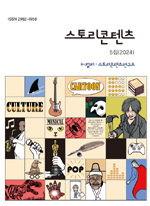다문화주의의 관점에서 본 SF 게임 속 포스트휴먼
Posthumans in SF games from the perspective of multiculturalism: Focusing on the case of <Detroit: Become Human>
- 경희대학교 K-컬처·스토리콘텐츠연구소
- 스토리콘텐츠
- 5집
-
2024.07153 - 176 (24 pages)
-
DOI : 10.56659/kcsc.2024.07.31.153
- 72

<디트로이트: 비컴 휴먼>의 중심인물 ‘카라’, ‘코너’, ‘마커스’는 전형적인 인물에서 벗어나면서 존재론적 위상을 획득한다. 여기서 주목해야 할 점은 다름 아닌 존재론적 위상을 획득하는 구도에 있다. ‘인간’과 동등한 지위를 획득하기 위해 스스로를 ‘인간화’로 접근하지 않는다. 즉, ‘불량품의 비인간-되기’로 접근한다. 안드로이드에게 있어 ‘불량품’은 오히려 ‘인간적’이기 때문에 존재론적 차이를 전제하고 있는 ‘인간’에게 위협적인 요소로 작동한다. 따라서 인간적인 ‘불량품’이 ‘인간-되기’를 취하는 순간 안드로이드는 인간을 대체할 수 있는 존재가 되며 대립하는 사태는 더욱 악화된다. 다만, 인간 소외의 결과물로서의 ‘비인간’이 되는 것이 아니라 ‘비인간-되기’를 자처할 때 ‘인간’ 못지않은 존재론적 위상을 획득하며 비로소 ‘자유로운 존재’가 될 수 있다. <디트로이트 >에서 볼 수 있는 포스트휴먼 문제 인식의 기원은 인종 또는 민족 차별문제에 뿌리를 두고 있다. 차별과 혐오의 대상으로 놓이는 ‘안드로이드’는 ‘인간’에 더 가까워질수록 대립이 심화하는 양상을 보여주는데, 이는 곧 주류문화 속 소외된 소수자의 위치와 유사하다. <디트로이트>는 이러한 상황에 대한 대응책을 제시해준다. ‘카라’에서는 ‘굴복’, ‘코너’에서는 ‘종속’ 그리고 마커스에서는 ‘적대’의 양상을 보여주는 한편, 이들의 서사가 ‘불량품’으로서 정체성을 확립해 나갈 때, 즉 ‘비인간-되기’를 실현할 때 ‘인간’과 동등한 존재론적 위상을 획득하고 있음을 확인할 수 있다.
Kara, Connor, and Marcus, the central characters of <Detroit: Become Human>, gain ontological status by breaking away from the typical. What is important to note here is how they acquire ontological status. They do not try to 'humanize' themselves in order to attain the same status as 'humans'. For example, while Bicentennial Man(1999) ends with the “humanization of the inhuman,” Detroit establishes its identity through the “inhumanity of the inhuman,” i.e., the “dehumanization of the defective.” For androids, the “defective” is the “inhumanity” of the defective. For the androids, the 'defective' is rather 'human' and therefore acts as a threat to the 'human', which presupposes an ontological difference. Therefore, the moment a human 'defect' takes on 'human-being', the android becomes a substitute for a human being, and the confrontation becomes even worse. However, it does not become 'non-human' as a result of human alienation, but when it becomes 'non-human', it acquires an ontological status as good as 'human' and can only become a 'free being'. The origins of the recognition of the posthuman problem in <Detroit> are rooted in the problem of racial or ethnic discrimination. The 'androids', which are placed as objects of discrimination and hatred, show a pattern of intensifying confrontation as they get closer to 'humans', which is similar to the position of marginalized minorities in mainstream culture. In other words, when a marginalized minority perfectly fulfills the tasks assigned to them by the mainstream culture, they become an intruder that threatens the mainstream culture. <Detroit> offers a response to this situation. While showing the aspects of 'submission' in Kara, 'subordination' in Connor, and 'antagonism' in Marcus, it can be seen that their narratives acquire an ontological status equal to that of 'humans' when they establish their identity as 'defective goods', that is, when they realize 'becoming non-human'. <Detroit> provides a glimpse into how the marginalized are viewed in mainstream culture.
Ⅰ. 서론
Ⅱ. 포스트휴머니즘과 미디어 속 포스트휴먼
Ⅲ. 다문화(주의)적 관점에서 본 <디트로이트 비컴 휴먼>
Ⅳ. 결론
참고문헌
(0)
(0)